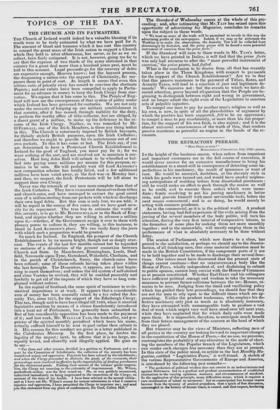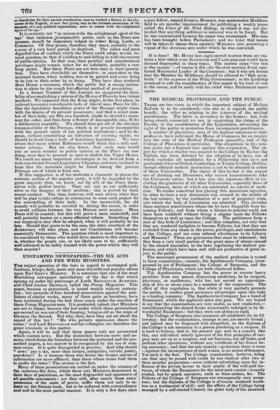THE REFRACTORY PEERAGE.
" More Peers, or none!"
MINISTERIAL CHRON/CLE, July 1833—passim. IN the height of the business season, when orders from impatient and important customers are in the full course of execution, it would never answer for an extensive manufacturer to bring his establishment to a stand-still in consequence of detecting some im- perfections in his machinery, the result of ignorance or want of care. He would be annoyed, doubtless, at the slovenly style in which his goods were turned out, and would have sundry unpleas- ing anticipations of scolding letters from dissatisfied purchasers :
still he would make an effort to push through the season as well as he could, and to execute those orders which were imme- diate; firmly resolving to put his jarring machinery in better trim, and provide himself with more serviceable tools, before the next season commenced : and in so doing, he would merely be acting with common prudence. As in the commercial, so it is in the political world. A prudent statesman, having had full experience of the evils arising from the jarring of the several members of the body politic, will turn his attention, during the very first interval of comparative leisure, to the formation of some plan for making them act more smoothly together; and in the meanwhile, will merely employ them in the performance of what is absolutely necessary to be done without delay.
The session of Parliament, which now draws to a close, has
proved to the satisfaction, or perhaps we should say to the dissatis- faction, of all thinking men, that some material alteration must be made in the British Constitution, if the component parts of it are to be held together and to be made to discharge their several func- tions. Our rulers must have discovered that the present state of things cannot continue—that an IRRESPONSIBLE body like the House of Peers, wholly independent of, and disdaining to submit to public opinion, cannot long coexist with the House of Commons as at present constituted. Whether Earl GREY and his colleagues have sufficient political zourage and wisdom to take the necessary measures to prevent future collisions between the two Houses, re- mains to be seen. Judging from the timid and vacillating policy which has guided their late proceedings, we should fear that they are not the men to rely upon in the difficult times which are ap- proaching. Unlike the prudent tradesman, who employs his de- fective machinery only just as much as is absolutely necessary, they have attempted with unmanageable tools to produce a vast deal of work which might very well have stood over till next year, while they have neglected that for which daily calls were made upon them. It is impossible, therefore, to anticipate much benefit from their future management of the concern at the head of which they are placed.
But whatever may be the views of Ministers, reflecting men of all parties in the country are looking forward to important changes in the constitution of the House of Peers,—for no one, we presume, contemplates the probability of any alteration in the mode of elect- ing the members of the Popular branch of the Legislature, which
can render such changes less necessary than they are at present. In this state of the public mind, an article in the last Monthly Ma- gazine, entitled "Legislative Peers," is well-timed. A sketch of the various Representative Governments of Europe and America, is introduced by the following just remarks- " The perfection of political wisdom does not consist in an indiscriminate zeal against Reformers, but in a gradual and prudent accommodation of established institutions to the varying opinions, manners, and circumstances of mankind. In the application of this principle, many difficulties occur, which it requires -a rare combination of talent to surmount: but so emancipated has human reason become from the tyranny of ancient prejudices, that a spirit of free discussion, unexampled in the history of former times, is roused, and that respect, bordering
on fanaticism for their ancient constitution, once so marked a feature in the cha- racter of the English, is now fast giving way to the intimate conviction of the necessity of a new political organization, more in unison with the enlightened, spirit of the age."
It is certainly not "in unison with the enlightened spirit of the age" that immense irresponsible power, such as the Peers now possess, should be separately lodged in either King, Lords, or Commons. Of that power, therefore, they must, probably in the course of a very brief period, be deprived. The safest and most dignified line of conduct which the Peers could adopt, would, be- yond question, be that of yielding to and falling in with the current of public opinion. In that case, their peculiar and constitutional privileges might remain intact for an indefinite, probably a very long period. But these Peers are not wise men in their genera- tion. They have churlishly set themselves in opposition to the
national, desires, when nothing was to be gained and every thing to be lost to their order by so doing. They have thus rendered their House a nuisance, which the public feel a strong inclina-. tion to abate by the rough but effectual method of prostration.
In a former Number of this Journal, we suggested the feasi- bility of accomplishing a reform of the House of Peers by less violent methods. We supposed that the King might, in the first place, be
induced to create a considerable body of liberal men Peers for life ; that the legislative hereditary power of the Peerage might cease
with the demise of its present possessors ; and that a select num- ber of their body, say fifty or a hundred, might be elected to repre- sent the order, and thus form a Senate of manageable size, fit for a deliberative assembly. We should thus get rid of the absolute irresponsibility of the Peerage, which is so grossly incompatible with the general spirit of our political institutions ; and by de-
grees, without committing an infraction of existing rights, we
should be freed from a body of hereditary legislators. We were aware that many ardent Reformers would think this a milk-and- water scheme. But we also knew, that such men would run as much counter to public opinion as the Peers are now doing, were they to proceed at once to abolish the Upper House. We could see many important advantages to be derived from a well-constituted Second Legislative Chamber, and were inclined to hope that the materials might be found among the present Peerage out of which to form one. If this suggestion is of too moderate a character to please the extreme section of the popular party, it will be regarded by the
great majority (but, we know, not by all) of the Peers them- selves with perfect horror. They are not as yet sufficiently alive to the dangers of their position : this is proved by their recent conduct. t''The time, however, will soon arrive, when they
will be glad to take refuge in submission to some such project for the remodelling of their body. In the meanwhile, the old remedy will probably be resorted to, during the recess, in order to avoid collision between the two Houses next session. More Peers will be created; but this will prove a mere makeshift, and
will probably hasten on a more effectual reform. Something like our suggestion may then be adopted, when it will probably be too late. Should that prove to be the case, the utter overthow of the Aristocracy will take place, and our Constitution will become essentially Democratic. The question which is most important to be considered by those who would drive matters to this extremity, is, whether the people are, or are likely soon to be, sufficiently well informed to be safely trusted with the power which they will then acquire?



















 Previous page
Previous page